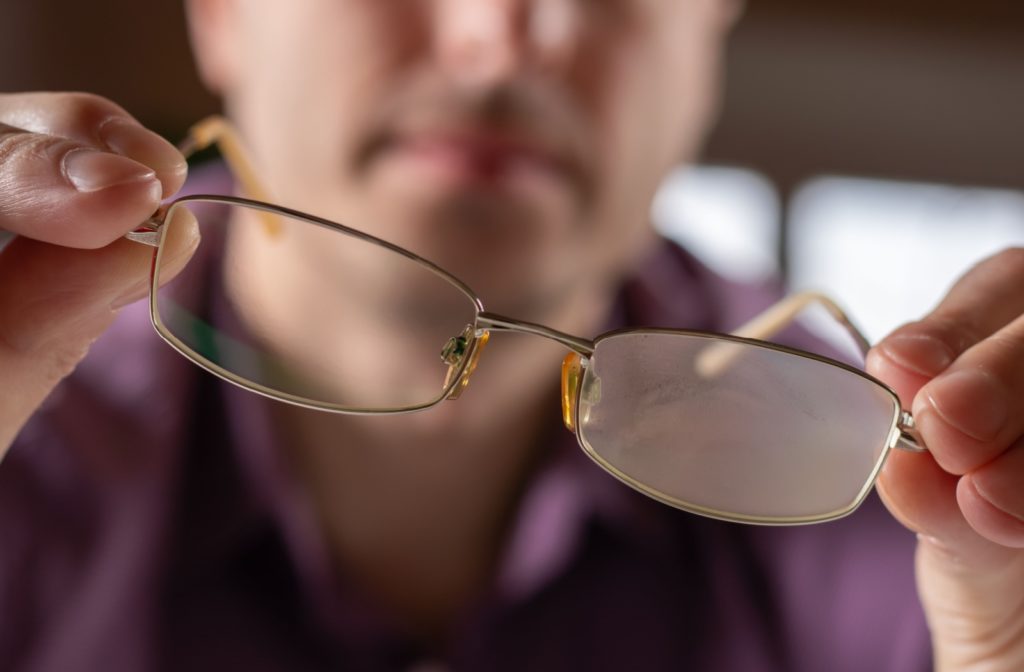Eyeglass wearers know all too well the frustration of lenses fogging up at the most inconvenient times. Squinting through fog or pulling out a cloth every couple of minutes shouldn’t be your life—and you shouldn’t have to switch to contact lenses to find relief.
Discover why your glasses fog up and how you can keep it from happening by:
- Getting fog-resistant lenses
- Adjusting your glasses’s fit
- Adjusting your mask
- Using anti-fog spray or wipes
- Trying the soap and water trick
The bottom line is that eyeglasses should never interfere with your vision or daily activities.
Why Do Glasses Get Foggy?
The “fog” that covers your lenses is actually just condensation, a natural process that happens when warm, moist air comes into contact with a cooler surface, causing water droplets to form. You may experience this phenomenon when you transition from a cold environment to a warmer one, such as stepping inside on a chilly day or exiting an air-conditioned room. The warm air touches your cold glasses, and you get condensation.
The problem may be worse if you live in a place with high humidity. High humidity levels mean more moisture in the air, increasing the amount of water droplets that can form.
Fogging is also a frequent annoyance for those wearing masks, as the mask directs your warm breath upward toward your glasses. Once again, you get condensation.
This can be particularly frustrating for those who rely on their glasses for clear eyesight for their work or play—or anyone who simply wants to navigate the world without an irritating distraction.
Practical Solutions for Preventing Fogging
When your lenses unexpectedly fog up, you’ll probably want a quick fix. Grab yourself a clean microfiber cloth and wipe the moisture away. Don’t use your shirt or a napkin, as either could scratch your lenses.
If you’re frequently dealing with foggy lenses, there are a few things you can do to try to stop the fog before it starts, including:
- Get a fog-resistant coating for your lenses: For a more permanent solution, consider investing in lenses with fog-resistant coatings. These coatings are applied during manufacturing and can significantly reduce fogging. While they might come at a higher initial cost, the convenience they offer can be well worth the investment.
- Adjust your glasses’ fit: Properly adjusted glasses can make a big difference. Make sure your glasses sit snugly and comfortably on your nose. Adjust the fit to minimize gaps where warm air can sneak in and cause fogging. This simple adjustment can significantly reduce the likelihood of fog build-up.
- Seal your mask tightly: If you’re wearing a face mask for any reason, ensure it fits securely around your nose. This helps direct airflow away from your lenses, reducing fogging. Consider masks with a nose bridge or adjustable straps for a more secure fit, or you can use a bandage across the top in a pinch.
- Anti-fog solutions: Invest in anti-fog sprays or wipes specifically designed for eyeglasses. These products create a barrier on your lenses that prevents condensation from forming. They’re easy to apply and can be a game changer, especially in humid environments.
- Try the soap-and-water trick: As you will see, not every DIY remedy is a hit, but a little application of soapy water can go a surprisingly long way. The soap leaves a thin film on the lenses that reduces surface tension, preventing fog from forming for between 4–6 hours. However, check with your eyeglass manufacturer to ensure the soap won’t damage any existing coatings on your lenses.

Anti-Fogging Methods to Avoid
Foggy lenses are so common, it’s no wonder people are always coming up with their own solutions. Innovative, yes, but not all DIY fixes are safe for your lenses. Avoid these common pitfalls to keep your eyewear in top condition:
- Toothpaste: While it might seem like a handy solution when you’re at home, toothpaste contains abrasive ingredients that can scratch and damage your lenses, impairing your vision and reducing the lifespan of your glasses.
- Polyethylene terephthalate (PET) film: These films are sometimes used in specific workplaces and, while they may prevent fogging, they actually cause water to collect into larger droplets on the lens, reducing overall visibility.
- Hand sanitizer: Another popular operating room solution. Hand sanitizer may help with foggy goggles, but the alcohol content can strip protective coatings from glasses, leading to long-term damage. It’s best to avoid using such products on your lenses.
A little maintenance and proper care can really improve your experience with your eyewear!
Discover a World of Clarity
Clear vision is crucial, and dealing with fogged lenses can be more than just a minor inconvenience. Try a few different solutions and figure out the one that works for you. Everyone’s needs are unique, but with a bit of care you can keep your eyeglasses clear and your vision unobstructed.
Book an appointment with Total Vision El Cajon to explore our range of glasses featuring fog-resistant coatings. Our team is dedicated to finding you lenses that offer style and practicality. Don’t wait any longer—embrace a clearer view of the world today!


